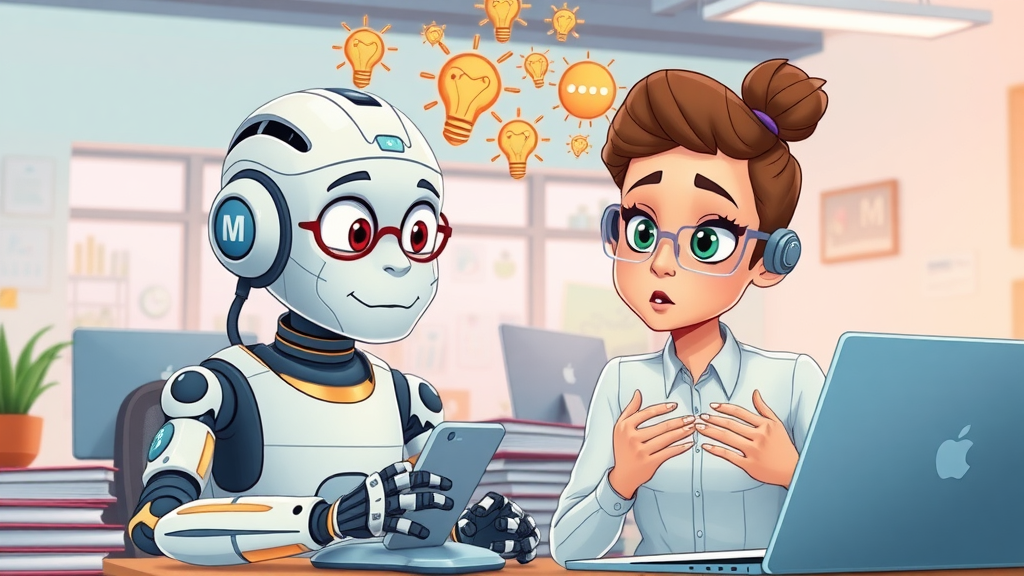Did you know that over 61% of marketers consider artificial intelligence the most important part of their data strategy today ? Imagine harnessing that power to create marketing campaigns that outperform the competition, convert at higher rates, and drive your business into the future. This detailed step-by-step guide will show you how to transform your marketing efforts and lead the AI marketing revolution right now.
Discover Why AI-Driven Marketing Campaigns Are Revolutionizing the Marketing Strategy Landscape
AI-driven marketing campaigns are fundamentally reshaping what modern marketing looks like. Leveraging machine learning , natural language processing , and predictive analytics , businesses can target their audiences more precisely than ever before. AI marketing enables real-time adaptation to customer behaviors, letting brands create personalized experiences across every touchpoint—something traditional strategies can’t match.
For example, leading companies use AI ad targeting to reach ideal customers on social media, automate content delivery for higher open rates, and optimize campaigns based on live feedback. These advancements help businesses scale efforts while improving engagement and ROI. As a result, marketing teams that embrace AI marketing campaigns are seeing game-changing results, from stronger market analysis to higher conversion rates and loyalty.

"Over 61% of marketers say artificial intelligence is the most important aspect of their data strategy today."
What You'll Gain: Mastering the Essentials of AI-Driven Marketing Campaigns
- The fundamentals of AI-driven marketing campaigns
- Key AI tools and technologies that drive results
- Real-world examples from leading brands
- Strategic steps for launching your own ai marketing campaign
- Insider tips to elevate your ai marketing strategy

Step 1: Set Clear Objectives for Your AI-Driven Marketing Campaigns
Success with ai-driven marketing campaigns starts by defining clear, measurable goals that align with your broader business objectives. Before leveraging any AI tool, pinpoint what you want to achieve—whether it’s boosting conversion rates, increasing social media engagement, or streamlining your marketing automation. Without well-defined objectives, even the most advanced ai marketing strategies may lack direction and measurable impact.
Align your ai marketing campaign goals by analyzing market opportunities and assessing current customer interactions. Use predictive analytics to forecast outcomes based on historical data, ensuring each campaign is grounded in actionable insights. This approach not only clarifies your roadmap but also allows for more targeted use of AI tools, maximizing each marketing effort’s return.
When you deploy AI-driven strategies, ensure every member of your team understands the marketing campaign objectives. Unified goals promote efficient collaboration across departments and guarantee that marketing automation aligns with your business mission and values.

Align AI Marketing Campaigns with Business Goals
- Define measurable outcomes
- Ensure alignment with overall marketing strategy
- Use predictive analytics for goal setting
Step 2: Analyze Your Customer Data Using Machine Learning in AI-Driven Marketing Campaigns
Machine learning is at the core of every effective AI marketing campaign. By analyzing massive amounts of customer data, AI can uncover patterns and trends that traditional analysis often misses. Use this power to segment audiences by behavior, preferences, and purchase history, guaranteeing your messages reach the right people at the right time.
Implementing natural language processing enables real-time sentiment analysis of social media posts, reviews, and customer service interactions. Detecting shifts in customer mood helps marketers adapt quickly, refining campaign messaging and offers for maximum engagement. Leveraging these methods gives your marketing campaigns a data-driven advantage, predicting which prospects are ready to convert and tailoring communication accordingly.
Predictive analytics then takes the guesswork out of campaign planning. By forecasting future customer actions, marketers can craft proactive, relevant outreach that increases conversions while reducing wasted spend. The insights generated throughout this process are crucial for ongoing optimization and growth in AI-driven marketing campaigns.
Unlock Customer Insights with Predictive Analytics and Natural Language Processing
- Leverage machine learning to segment customer base
- Apply natural language processing for sentiment analysis
- Use predictive analytics to forecast customer actions
Step 3: Choose the Best AI Tools for Effective AI-Driven Marketing Campaigns
Choosing the right ai tools is essential for launching successful AI-driven marketing campaigns. Today’s AI market offers an array of platforms covering marketing automation, content creation, email delivery, analytics, and more. Look for solutions that offer seamless integration into your existing stack and provide user-friendly interfaces for your entire team.
Compare ai tools by considering their features, pricing models, scalability, and specific use cases. For content generation, generative ai platforms streamline everything from social media posts to product descriptions, helping create personalized, customer-centric content easily. For analytics, advanced AI can monitor campaign outcomes in real time, providing actionable suggestions for improvement and optimization.
It’s crucial to select ai tools tailored to your team’s expertise and campaign goals. The most effective AI marketing campaigns combine several tools—automating routine tasks, identifying new opportunities, and driving higher ROI. Below is a comparison table of leading AI tools specifically for marketing:
| AI Tool | Features | Main Use Case | Pricing |
|---|---|---|---|
| HubSpot AI | Automation, lead scoring, predictive analytics | Email & workflow automation | Starts at $45/mo |
| Jasper | Generative AI content, language processing | Copywriting, blogs, ads | Starts at $39/mo |
| Persado | Predictive analytics, personalized messaging | Email, ad campaigns, product descriptions | Custom quote |
| Salesforce Einstein | Real-time data insights, automation | CRM analytics, multichannel marketing | Custom quote |

Top AI Tools for AI Marketing Campaigns Success
- Compare the latest ai tools for marketing automation
- Find the right ai tool for content creation, email marketing, and data analytics
- Utilize generative ai for creative assets and automation
Step 4: Develop Targeted Content for AI-Driven Marketing Campaigns
With generative ai and advanced language processing , creating high-impact, personalized content is easier than ever. AI not only streamlines the production of blogs, emails, and social media posts; it also tailors messaging to each segment of your audience based on real-time behavioral data.
Personalization is the hallmark of successful AI marketing. By integrating natural language technology, marketers can craft product descriptions, ad copy, and media posts that resonate deeply with their target audience. Use AI tools to analyze which types of generated content drive the best results, then refine your messaging accordingly for ongoing improvement.
Machine learning insights additionally help optimize not just what you say, but how and when you say it. Experiment with A/B testing using AI-powered suggestions, refine campaign elements, and ensure that every marketing campaign leverages the latest trends in customer communication.

Personalize Content Using Generative AI and Language Processing
- Use generative ai for engaging content generation
- Integrate natural language for customer-centric messaging
- Optimize content with machine learning insights
Step 5: Automate and Optimize With AI Marketing Automation
The power of marketing automation comes to life when paired with AI. Automation platforms allow teams to orchestrate multichannel marketing campaigns —from emails to paid ads—without manual intervention. Using AI marketing ensures that every touchpoint is optimized for timing, frequency, and message relevance.
Scheduling ai-powered marketing campaigns enhances ROI, as predictive analytics refine when and where your messages appear. This way, you can target users precisely when they’re ready to engage or purchase, minimizing waste and maximizing conversions.
Continuous optimization is critical. AI automatically analyzes real-time results, making suggestions for tweaks to improve subsequent campaigns. Effective marketing teams monitor these automated recommendations to keep every marketing effort aligned with broader strategic goals.
Streamline Marketing Campaigns with AI Marketing Automation
- Automate multichannel campaigns with ai marketing automation platforms
- Enhance ROI by scheduling AI-powered marketing campaigns
- Utilize predictive analytics to refine marketing automation
Step 6: Enhance Customer Interaction in AI-Driven Marketing Campaigns
Customer engagement is where ai-driven marketing campaigns truly shine. AI-powered chatbots offer real-time support, answering customer questions instantly and collecting valuable feedback. These natural language tools don’t just automate customer service—they create more positive, memorable brand interactions.
Personalization also extends to live communications. With advanced natural language processing , AI can analyze conversation context, detect sentiment, and dynamically tailor responses. This ensures every interaction, from a simple inquiry to a complex complaint, is handled with nuance and empathy.
Feedback matters in today’s fast-paced digital world. Analyze engagement trends using AI-driven tools to iterate and refine customer journeys. Applying these insights, marketers maintain an edge over competitors and deliver proactive, customer-first service across every channel.

Harness AI Chatbots, Natural Language, and Personalization
- Implement AI chatbots for real-time engagement
- Personalize interactions with natural language processing
- Analyze feedback with AI-driven tools
Step 7: Launch AI Ads for High-Performance Marketing Campaigns
AI is revolutionizing digital advertising. Marketers use generative ai and machine learning to design creative, high-converting ai ad campaigns that attract the right audience segments across multiple platforms. These tools can instantly adjust ad creative, copy, and visuals based on real-time market data and user response.
Predictive analytics also play a central role in forecasting which ads will perform best, enabling teams to optimize placement for maximum reach and lower costs. AI marketing further automates A/B testing, ensuring only the top-performing ads continue to run, saving budget and boosting overall campaign effectiveness.
Whether you’re crafting video ads, banner creatives, or social media post series, ai-driven campaigns ensure that each touchpoint is data-driven and constantly improving. The result? More meaningful engagement, higher click-through rates, and improved conversion rate metrics.
Use Machine Learning to Target and Optimize AI Ads
- Develop ai ad creatives using generative ai tools
- Leverage ai market data for predictive ad performance
- Optimize ad placement across digital platforms
Step 8: Monitor Results and Iterate on AI Marketing Campaigns
No AI marketing campaign is complete without robust monitoring and iteration. Set up custom dashboards leveraging predictive analytics to view success metrics and campaign progress in real time. AI tools can track open rates, click-throughs, and conversions to reveal which strategies are truly effective.
Continuous monitoring allows teams to immediately spot underperformance and adjust their outreach, assets, or audience segments. The best marketers use real-time data insights to tweak messaging, timing, and even campaign goals until target results are achieved.
Iteration is key: use every new campaign cycle to refine your approach. As AI market dynamics shift, agile marketers who embrace change and leverage real time analytics will always have a competitive edge in the ever-evolving marketing landscape.

Evaluating Campaign Success with Predictive Analytics and Reporting
- Set up predictive analytic dashboards for marketing campaigns
- Use ai tools for continuous campaign monitoring
- Iterate based on real-time data insights
Step 9: Learn From Industry Leaders in AI-Driven Marketing Campaigns
Studying the world’s most successful brands provides invaluable insights into what makes AI-driven marketing campaigns work. Coca-Cola, for example, leverages AI to drive media post engagement, automate content production, and optimize ad campaigns globally. Their results: increased customer loyalty, wider reach, and improved conversion rates.
Leading tech companies use the AI market’s latest advancements to automate marketing efforts, from social listening to predictive lead scoring. Analyzing these approaches—how AI marketing campaigns are executed and iterated on—can reveal new tactics for your own marketing strategy.
Pay attention to trends shaping marketing campaigns : deeper personalization, multichannel automation, and predictive content creation. Following the blueprint of industry leaders enables you to fast-track AI adoption and drive measurable business growth.

Case Studies: AI Marketing Campaigns from the AI Market’s Top Brands
- Review Coca-Cola’s ai marketing strategy
- Explore examples from leading tech brands on ai-driven marketing campaigns
- Analyze the ai market trends shaping future marketing campaigns
Step 10: Overcome Common Pitfalls in AI-Driven Marketing Campaigns
While AI-driven marketing campaigns create new opportunities, they also present unique challenges like data bias, privacy concerns, and potential errors in automation. Recognizing ethical risks in AI marketing is critical—ensure your algorithms remain unbiased and inclusive by regularly auditing both data inputs and AI-generated content.
Data privacy is another hot topic. Respect customer information at every interaction point, complying with legal frameworks like GDPR. Secure data storage and robust encryption safeguard user trust, which is essential for long-term marketing success and brand reputation.
Finally, build contingency plans to quickly address any mistakes or failures in your ai ad campaigns or marketing automation routines. Swiftly correct errors, update algorithms, and communicate openly with your audience to protect your company’s credibility in the AI market.

Addressing Data Bias, Privacy, and AI Marketing Challenges
- Identify ethical risks in ai marketing campaigns
- Manage data privacy in customer interactions
- Mitigate ai ad and automation errors
Frequently Asked Questions About AI-Driven Marketing Campaigns
How is AI used in marketing campaigns?
AI is used in marketing campaigns to automate tasks, analyze customer data, personalize content, and optimize ad placements. Machine learning algorithms segment audiences for targeted messages, predictive analytics forecast customer actions, and AI-powered chatbots provide real-time support—boosting engagement and ROI.
What is an example of an AI driven marketing strategy?
An AI-driven marketing strategy might use generative AI to craft personalized email subject lines, recommend products based on user behavior, and schedule ads when the target audience is most likely to engage. Real-time analytics ensure each element is continually refined for peak performance.
What company uses AI for marketing?
Many leading brands use AI for marketing, including Coca-Cola, Netflix, and Amazon. These companies leverage AI tools for content personalization, localized ad campaigns, customer support automation, and predictive analytics to drive conversion rates and brand loyalty.
How does Coca-Cola use AI in marketing?
Coca-Cola employs AI to monitor social media sentiment, generate creative media posts, and personalize customer marketing campaigns globally. Their use of AI helps the brand optimize ad placements, automate content creation, and deliver more engaging consumer experiences across markets.
Expert Insights: Leading Marketers on AI-Driven Marketing Campaigns
"AI is transforming how marketers interact with customers by making every message more relevant and timely." — Industry Analyst
"Companies embracing AI-driven marketing campaigns see up to 30% higher conversion rates." — Marketing Technology Report

Handy Checklist: Launching Your AI-Driven Marketing Campaign
- Define your campaign objective
- Collect and analyze customer data
- Select the best ai tools
- Generate dynamic, personalized content
- Automate marketing efforts
- Create engagement with AI-powered chatbots
- Design and optimize ai ads
- Continuously monitor analytics
- Study industry leaders’ approaches
- Stay alert for AI pitfalls and solutions
Key Takeaways for Successful AI-Driven Marketing Campaigns
- AI-driven marketing campaigns transform customer engagement and ROI
- Machine learning, predictive analytics, and generative AI are game changers
- Personalization, automation, and continuous optimization are crucial
- Learning from real-world examples boosts success

Ready to Launch Your AI-Driven Marketing Campaigns? Take Action Now to Lead the AI Marketing Revolution
It's your turn: Start building your winning AI-driven marketing campaigns today and set your brand apart as a trailblazer in the AI marketing era!
Incorporating AI into marketing strategies has led to groundbreaking campaigns that enhance personalization and engagement. For instance, Heinz’s “A.I. Ketchup” campaign utilized DALL-E 2 to generate images of ketchup, consistently resembling Heinz’s products, even with abstract prompts like “Renaissance Ketchup Bottle.” This initiative resonated with younger audiences and showcased Heinz as the definitive ketchup brand. ( multitouchmarketing.agency )
Similarly, Coca-Cola’s “Create Real Magic” campaign invited users to generate artwork using generative AI tools like DALL-E 2 and ChatGPT. Over 120,000 pieces of user-generated content were created, with users spending an average of over seven minutes per visit on the platform. This campaign demonstrated how AI can foster deeper connections with consumers by encouraging creativity and participation. ( multitouchmarketing.agency )
These examples illustrate the transformative potential of AI in crafting marketing campaigns that are both innovative and deeply personalized.
 Add Row
Add Row  Add
Add 






Write A Comment